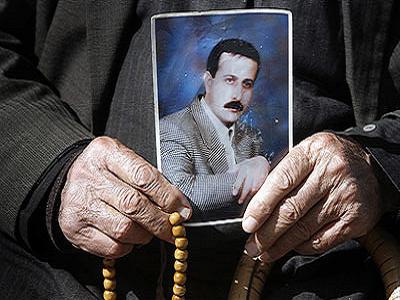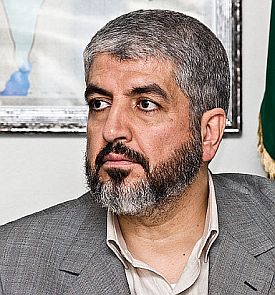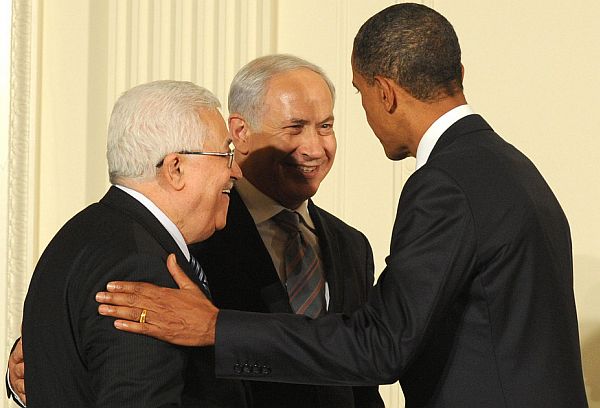If mainstream media reports and government statements could be relied upon, the Bush administration and the Israeli governments led by Ariel Sharon and then Ehud Olmert were perpetually of one mind — Washington simply mirrored Jerusalem. But newly-released cables indicate that when it came to views about Hamas’ control of Gaza, there was in 2007 a significant divergence of opinion. While a plan hatched by Elliot Abrams for a US-supported Fatah coup to unseat the democratically-elected Hamas government, was rapidly unraveling, the Israelis said they would be pleased to see Hamas assume complete control of Gaza.
A cable describing a June 12, 2007 meeting between US Ambassador Richard Jones and Israeli Military Intelligence Director Amos Yadlin indicated that Israel regarded Gaza as less of a threat than Iran, Syria or Hezbollah. At the height of the eight-day battle between Hamas and Fatah for the control of Gaza, the cable said:
The Ambassador commented that if Fatah decided it has lost Gaza, there would be calls for Abbas to set up a separate regime in the West Bank. While not necessarily reflecting a consensus GOI [Government of Israel] view, Yadlin commented that such a development would please Israel since it would enable the IDF to treat Gaza as a hostile country rather than having to deal with Hamas as a non-state actor. He added that Israel could work with a Fatah regime in the West Bank. The Ambassador asked Yadlin if he worried about a Hamas-controlled Gaza giving Iran a new opening. Yadlin replied that Iran was already present in Gaza, but Israel could handle the situation “as long as Gaza does not have a port (sea or air).” [Emphasis mine.]
Implicit in Yadlin’s remarks was the view that Hamas’ control of Gaza would make it easier for Israel to control the territory from the air with more frequent missile attacks.
As the US ambassador questioned the Israeli intelligence chief, one has to wonder whether either of them had been briefed on the Abrams plan.
In a report published by Vanity Fair in April 2008, David Rose wrote:
Vanity Fair has obtained confidential documents, since corroborated by sources in the U.S. and Palestine, which lay bare a covert initiative, approved by Bush and implemented by Secretary of State Condoleezza Rice and Deputy National Security Adviser Elliott Abrams, to provoke a Palestinian civil war. The plan was for forces led by [Palestinian Authority National Security Advisor Muhammad] Dahlan, and armed with new weapons supplied at America’s behest, to give Fatah the muscle it needed to remove the democratically elected Hamas-led government from power. (The State Department declined to comment.)
But the secret plan backfired, resulting in a further setback for American foreign policy under Bush. Instead of driving its enemies out of power, the U.S.-backed Fatah fighters inadvertently provoked Hamas to seize total control of Gaza.
Some sources call the scheme “Iran-contra 2.0,” recalling that Abrams was convicted (and later pardoned) for withholding information from Congress during the original Iran-contra scandal under President Reagan. There are echoes of other past misadventures as well: the C.I.A.’s 1953 ouster of an elected prime minister in Iran, which set the stage for the 1979 Islamic revolution there; the aborted 1961 Bay of Pigs invasion, which gave Fidel Castro an excuse to solidify his hold on Cuba; and the contemporary tragedy in Iraq.
Within the Bush administration, the Palestinian policy set off a furious debate. One of its critics is David Wurmser, the avowed neoconservative, who resigned as Vice President Dick Cheney’s chief Middle East adviser in July 2007, a month after the Gaza coup.
Wurmser accuses the Bush administration of “engaging in a dirty war in an effort to provide a corrupt dictatorship [led by Abbas] with victory.” He believes that Hamas had no intention of taking Gaza until Fatah forced its hand. “It looks to me that what happened wasn’t so much a coup by Hamas but an attempted coup by Fatah that was pre-empted before it could happen,” Wurmser says.
The botched plan has rendered the dream of Middle East peace more remote than ever, but what really galls neocons such as Wurmser is the hypocrisy it exposed. “There is a stunning disconnect between the president’s call for Middle East democracy and this policy,” he says. “It directly contradicts it.”
While media reports at that time described the fight between Hamas and Fatah as being a “Hamas coup”, the Israeli intelligence chief did not see Hamas’ attacks as “part of a premeditated effort to wipe out Fatah in Gaza.”
What is transparent in both the Abrams plan and also now revealed in several cables, is that when it comes to the partnerships Israel and the US have backed with the Palestinians, whether Palestinian leaders had political legitimacy or popular support was of little concern — the sole requirement was that Israel/US work with Palestinians willing to place Israel’s interests first. In other words, Israel wanted to back a Palestinian leadership which would be incapable of surviving without Israeli support.
In a June 11, 2007 meeting between the US ambassador and Yuval Diskin, the head of Israel’s internal security service, Shin Bet, the Israeli described a “very good working relationship” with a Palestinian intelligence chief, Tawfik Tirawi, who he described as “psychopathic, cruel, dangerous and prone to extreme mood swings.”
In the West Bank, Diskin said that ISA [Shin Bet] has established a very good working relationship with the Preventive Security Organization (PSO) and the General Intelligence Organization (GIO). Diskin said that the PSO shares with ISA almost all the intelligence that it collects. They understand that Israel’s security is central to their survival in the struggle with Hamas in the West Bank. [Emphasis mine.]


 Eight months after the murder of the Hamas commander, Mahmoud al-Mabhouh, in Dubai, two reports in the last few days present intriguingly contradictory pictures.
Eight months after the murder of the Hamas commander, Mahmoud al-Mabhouh, in Dubai, two reports in the last few days present intriguingly contradictory pictures. Classified by the US as a “terrorist” organization, Hamas has spent the past year battling armed Salafist extremists who want to enforce Islamic law in the Gaza Strip and who view the Hamas leadership as too weak-willed to challenge Israel’s occupation of Palestine.
Classified by the US as a “terrorist” organization, Hamas has spent the past year battling armed Salafist extremists who want to enforce Islamic law in the Gaza Strip and who view the Hamas leadership as too weak-willed to challenge Israel’s occupation of Palestine.
